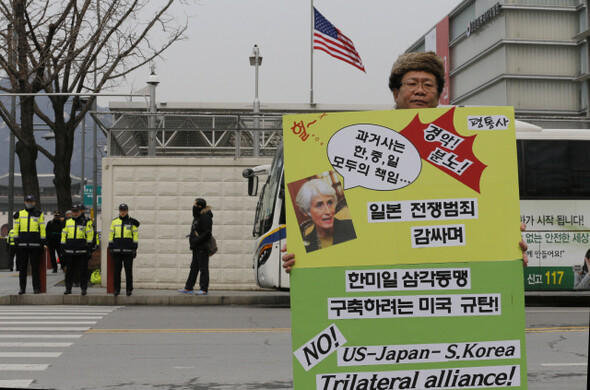hankyoreh
Links to other country sites 다른 나라 사이트 링크
US attempting to downplay official’s comments on history in Northeast Asia

After remarks by US Under Secretary of State for Political Affairs Wendy Sherman about historical issues in Northeast Asia provoked controversy, the US government moved swiftly to play down the remarks, claiming that her meaning had not been communicated properly. But despite this explanation, suspicions about the real motivations of the US are unlikely to be so easily assuaged.
In a statement released on Mar. 2, the US State Department said, “We continue to emphasize the importance of approaching historical legacy issues in a manner that promotes healing and reconciliation. As we have said many times, the apologies extended by previous Japanese Prime Minister Murayama and former Chief Cabinet Secretary Kono marked an important chapter in Japan improving relations with its neighbors.”
This is seen as reaffirming the official position of the US government that Japan needs to apologize and show remorse. Historical tensions have been high in Northeast Asia since Japanese Prime Minister Shinzo Abe paid his respects at the Yasukuni Shrine in Dec. 2013.
The US State Department also referred to remarks made by US President Barack Obama about the comfort women during a joint press conference with President Park Geun-hye when he visited South Korea in Apr. 2014.
“The trafficking of women for sexual purposes by the Japanese military during World War II was a terrible, egregious violation of human rights,” the statement said.
“It is in the interest of both Japan and the Korean people to look forward as well as backwards and to find ways in which the heartache and the pain of the past can be resolved. We encourage Japan to continue to address this issue in a manner that promotes healing and facilitates better relations with neighboring states,” Obama was quoted as saying during the press conference.
It is rare for the US State Department to explain a specific issue at such length, suggesting American concerns that Sherman‘s remarks could aggravate public opinion in South Korea.
But doubts remain despite the State Department’s explanation.
“[Sherman’s] remarks in no way reflect a change in US policy and were not intended to be about any one person or one country,” said US State Department Deputy Spokesperson Marie Harf during the regular press briefing on Mar. 2.
“I think we were, frankly, a little surprised to see that some interpreted her remarks as being directed at any particular leader in the region,” Harf also said, taking aim at the Korean press.
During her speech on Feb. 27, Sherman described the historical and territorial conflict between South Korea, China, and Japan as “frustrating,” immediately before criticizing political leaders for taking advantage of nationalistic sentiment.
At the end of the speech, she returned to problems with leaders, noting that “This brings us back full circle to the question of leadership.”
Whichever way this is looked at, it appears that her speech was aimed at the leaders of Northeast Asia.
By Park Hyun, Washington correspondent
Please direct questions or comments to [english@hani.co.kr]

Editorial・opinion
![[Column] Has Korea, too, crossed the Rubicon on China? [Column] Has Korea, too, crossed the Rubicon on China?](https://flexible.img.hani.co.kr/flexible/normal/500/300/imgdb/original/2024/0419/9317135153409185.jpg) [Column] Has Korea, too, crossed the Rubicon on China?
[Column] Has Korea, too, crossed the Rubicon on China?![[Correspondent’s column] In Japan’s alliance with US, echoes of its past alliances with UK [Correspondent’s column] In Japan’s alliance with US, echoes of its past alliances with UK](https://flexible.img.hani.co.kr/flexible/normal/500/300/imgdb/original/2024/0419/2317135166563519.jpg) [Correspondent’s column] In Japan’s alliance with US, echoes of its past alliances with UK
[Correspondent’s column] In Japan’s alliance with US, echoes of its past alliances with UK- [Editorial] Does Yoon think the Korean public is wrong?
- [Editorial] As it bolsters its alliance with US, Japan must be accountable for past
- [Guest essay] Amending the Constitution is Yoon’s key to leaving office in public’s good graces
- [Editorial] 10 years on, lessons of Sewol tragedy must never be forgotten
- [Column] A death blow to Korea’s prosecutor politics
- [Correspondent’s column] The US and the end of Japanese pacifism
- [Guest essay] How Korea turned its trainee doctors into monsters
- [Guest essay] As someone who helped forge Seoul-Moscow ties, their status today troubles me
Most viewed articles
- 1[Column] The clock is ticking for Korea’s first lady
- 2After 2 months of delayed, denied medical care, Koreans worry worst may be yet to come
- 3[Column] Has Korea, too, crossed the Rubicon on China?
- 4US overtakes China as Korea’s top export market, prompting trade sanction jitters
- 5[Correspondent’s column] In Japan’s alliance with US, echoes of its past alliances with UK
- 6Hong Se-hwa, voice for tolerance whose memoir of exile touched a chord, dies at 76
- 7All eyes on Xiaomi after it pulls off EV that Apple couldn’t
- 8[News analysis] After elections, prosecutorial reform will likely make legislative agenda
- 9More South Koreans, particularly the young, are leaving their religions
- 10John Linton, descendant of US missionaries and naturalized Korean citizen, to lead PPP’s reform effo